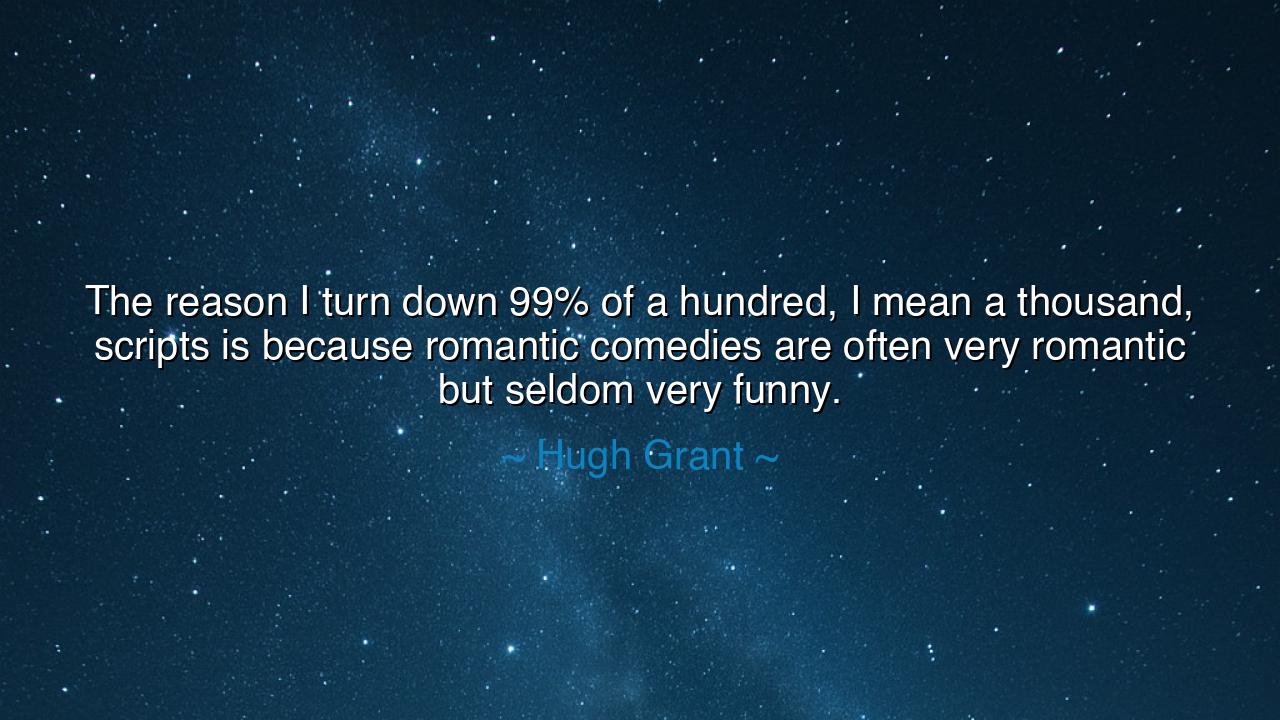
The reason I turn down 99% of a hundred, I mean a thousand
The reason I turn down 99% of a hundred, I mean a thousand, scripts is because romantic comedies are often very romantic but seldom very funny.






In the words of Hugh Grant, “The reason I turn down 99% of a hundred, I mean a thousand, scripts is because romantic comedies are often very romantic but seldom very funny.” — we hear not arrogance, but the lament of a craftsman who knows the delicate balance of art. These are the words of a man who has stood at the heart of the genre itself, who has tasted its triumphs and seen its decline. Within his reflection lies a truth that reaches beyond cinema: that love without laughter grows heavy, and laughter without love grows shallow. The harmony of the two is rare, sacred, and true.
For what is a romantic comedy, if not a mirror of life itself? Love, in its purity, must dance with humor to remain alive. The ancient poets knew this — they spoke of Eros, the god of love, and Gelōs, the spirit of laughter, as kin of the same divine flame. One gives passion, the other lightness; one moves the heart, the other frees it. To love deeply is noble, but to laugh while loving is divine. Thus, when Grant says that the stories offered to him are “very romantic but seldom funny,” he speaks of a world that has forgotten this truth — a world that has kept the form of love, but lost its spirit.
The meaning of his words extends beyond the screen. In every art, and in every life, there must be balance between depth and delight. Too much solemnity, and love becomes a burden. Too much jest, and it becomes hollow. The greatest artists — in film, poetry, and song — are those who understand that laughter does not diminish emotion; it completes it. Shakespeare himself, the master of human feeling, wove humor into tragedy and tenderness into comedy. His lovers — Beatrice and Benedick, Rosalind and Orlando — sparred with wit as fiercely as they loved with heart. Their laughter was not mockery, but the very pulse of affection.
To illustrate this truth, let us recall Charlie Chaplin, the man who made the world laugh through tears. In City Lights, his little tramp falls in love with a blind girl. The story is romantic beyond measure, yet every moment of its beauty is bound to laughter. We laugh not because we are distant from his pain, but because we recognize it — because in his clumsy sincerity, we see ourselves. Chaplin achieved what Hugh Grant mourns the loss of: the perfect marriage of humor and heart, where love is not preached, but felt through laughter.
The origin of Grant’s frustration, then, lies in his devotion to authenticity. He is not rejecting romance — he is defending its honor. For true romance is not found in words of passion alone, but in the shared laughter between two souls who find joy even in imperfection. The greatest love stories are not about beauty or grand gestures, but about the ability to laugh together amid the chaos of being human. When films forget this — when they paint love in flawless strokes without wit or warmth — they lose the pulse of life itself.
The lesson, then, is simple yet profound: whether in art or in love, seek the union of joy and sincerity. Do not fear to laugh amid your passion, nor to feel deeply amid your laughter. For it is the weaving of both that makes love — and life — whole. The ancients knew that laughter is a form of courage, a defiance against despair, and that humor, when born of kindness, is a higher wisdom than solemnity could ever reach.
Therefore, my friends, let this wisdom guide you: when you speak of love, let it be light as well as deep; when you create, let your creation bring both smile and soul. For laughter without love is empty, but love without laughter is fragile. To find both is the art of living well — the art that Hugh Grant, knowingly or not, defends with his words.
So laugh with those you love, and love those who make you laugh. Cherish not only the moments of grand passion, but the small absurdities that make love human and real. For it is in those shared bursts of joy — the kind that echo like music in the heart — that we find what every artist, every lover, every soul has ever sought: the union of truth and delight, the romance that endures because it remembers to laugh.






AAdministratorAdministrator
Welcome, honored guests. Please leave a comment, we will respond soon